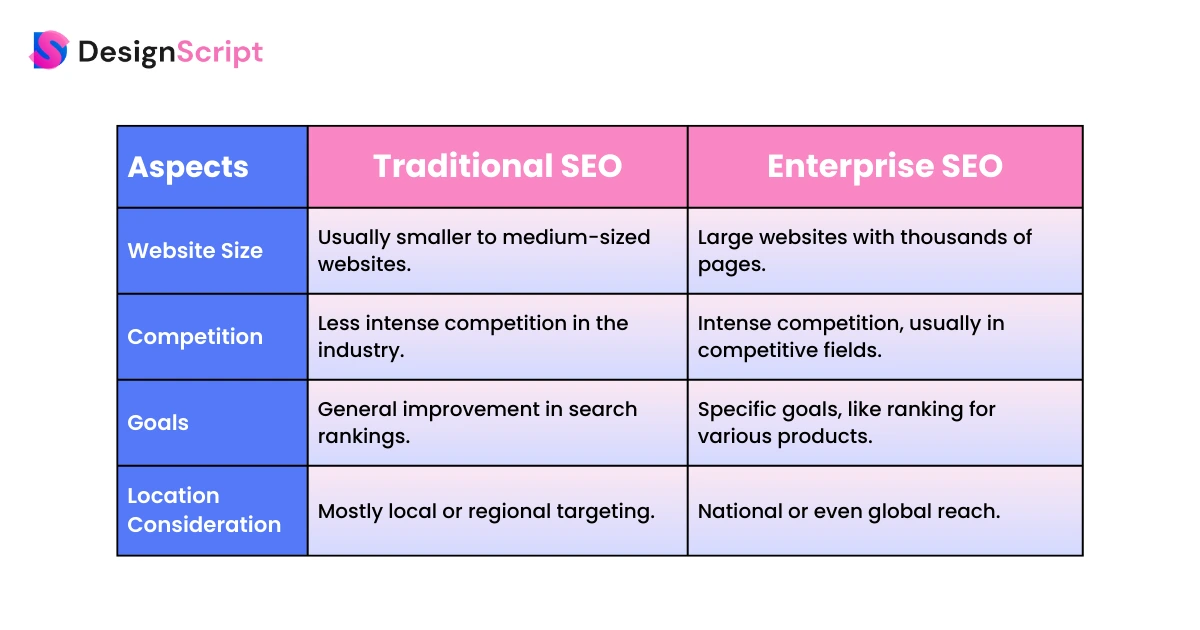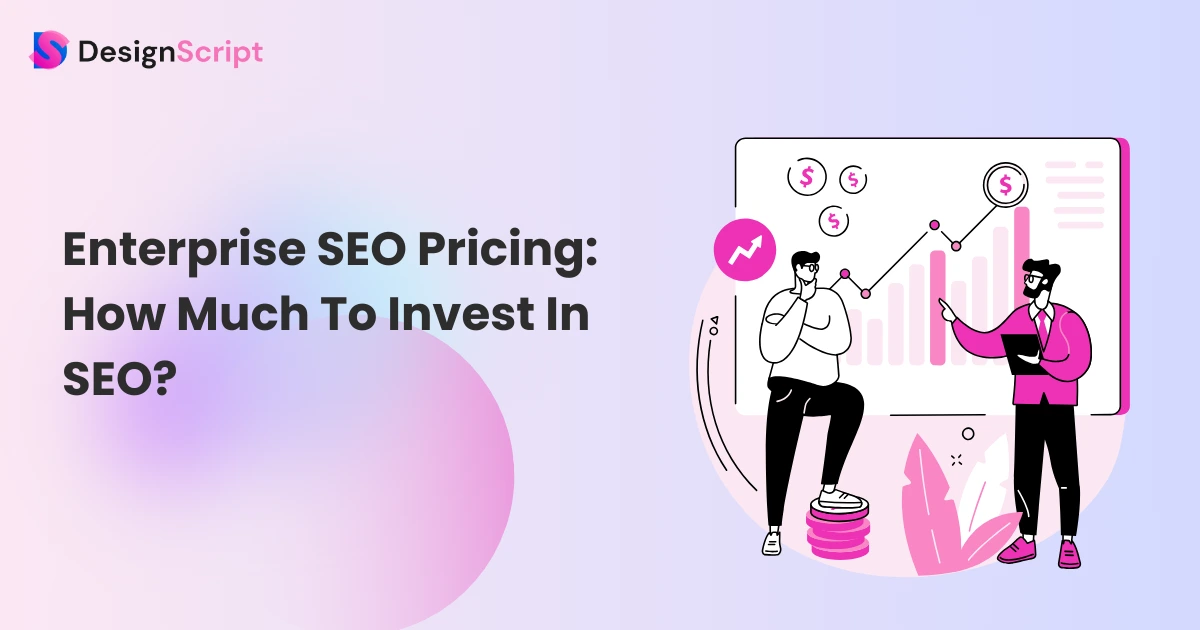Enterprise SEO Pricing: How Much To Invest In SEO?
Have you ever wondered how businesses determine the price they should pay for enterprise SEO (Search Engine Optimization)?
It’s quite a puzzle. Finding the perfect price can feel like a big challenge with factors like how tough the competition is, how well your website works, and how much money you must spend.
Without a strong understanding of enterprise SEO pricing, you could feel lost and unsure, which might lead to spending too much or missing out on crucial optimization opportunities.
But don’t worry! In this blog post, we’ve got your back. We will explain how businesses decide how much to pay for SEO. You’ll clearly understand these pricing tricks and typical costs by the end. This way, you can pick what works just right for you.
No more confusion—let’s jump in and master enterprise SEO pricing!
Table of Contents
What Is Enterprise SEO?
Enterprise SEO is a digital marketing plan for large websites with millions of pages. Its main goal is to make these websites appear higher on search engines, bringing more people to visit them.
The core principles of enterprise SEO are similar to regular SEO, including on-page, off-page, and technical enhancements. However, the way you put these strategies into action is on a much larger level due to the vast number of pages and resources needed.
Enterprise SEO holds importance due to the following reasons:
- Audience Reach: It places you directly in front of your target audience.
- Competitive Edge: It enables you to outshine your rivals.
- Brand Visibility: It boosts and sustains the visibility of your brand.
- Customer Attraction and Revenue: It draws potential clients and generates earnings naturally.
- Efficient Business Expansion: It supports the streamlined growth of your expanding enterprise.
Difference Between Enterprise SEO Pricing And That Of Traditional SEO
Regarding SEO, there’s a big difference between what’s called “Enterprise SEO” and the more common “Traditional SEO.” Enterprise SEO is like the superhero version of SEO – it’s for really big and complex websites. Think of it like comparing a small family car to a massive truck that hauls goods across countries.
Here’s why Enterprise SEO Costs More Than Traditional SEO:
- Increased Resource Needs: When it comes to websites of big businesses, there’s a good reason why the cost for SEO is higher than smaller ones. Think of it as needing more tools, people, and time to paint a huge building than a small house. Enterprises have websites with thousands of pages, which means there’s a lot more stuff to work on. It requires more software, writers, and other employees to do the job well.
- Tougher Competition: Picture a race where everyone is running fast. That’s what it’s like in the world of big businesses. If your company is going after keywords many other companies also want, it’s like running in a super competitive race. You might need to spend more resources to ensure your website comes out on top – just like how a runner needs better shoes and more training to win a tough race. This extra investment in SEO is important because it helps your website get more visitors without paying for ads.
- Focused Keyword Strategy: Imagine you’re trying to sell something special, like ice cream on a hot summer day. You’d want to talk to the people who want ice cream. You have to do that with their keywords when you have an enterprise. You need to try to connect with a very specific group of people. It means the things you write and create on your website are aimed at exactly those people. For that, you need SEO experts who are good at this targeted stuff to ensure everything works perfectly. And because this is a special skill, it often costs more than regular SEO.
Traditional SEO vs Enterprise SEO Pricing

Common Factors Affecting Enterprise SEO Pricing
The cost of Enterprise SEO isn’t a one-size-fits-all deal. The pricing can vary significantly based on several key factors carefully woven into your business’s fabric and digital aspirations. Let’s explore these factors:
1. Size and Complexity of the Website

Think of your website as a big, digital world with many different parts, just like a big city with many streets. The more complicated your website is, the more work it takes to make everything work well. Big websites, especially those of big companies, have many pages and sections, just like a city has many neighborhoods. Ensuring everything on your website is in great shape requires careful checking, making things better, and always keeping an eye on it. Because of the size and complexity, this extra work can increase the cost of Enterprise SEO.
2. Competitiveness of the Industry

Consider industries like sports teams playing in different leagues. Some leagues have tougher competitions than others. Similarly, some industries have more companies trying hard to be on the top of search results. It makes it harder to get noticed online. If your business is in such a busy industry, it’s like being in a big race where everyone wants to win. To stand out, you need to plan well, do research, and keep working hard all the time. This extra work in tough industries means you must spend more on SEO to ensure people can find you online.
3. Goals of the SEO Campaign

Consider Enterprise SEO as a tailored suit – designed to fit your needs. The strategy might lean towards a general optimization approach if your SEO goals are as straightforward as improving overall visibility. However, if your enterprise has specific goals, such as ranking for certain keywords, targeting a particular audience segment, or boosting sales for a particular product, the strategy becomes more intricate. Tailoring SEO efforts to meet these specific goals requires additional planning, content creation, and tracking mechanisms, which can impact the pricing.
4. Location of the Business

The scope of your business’s geographic reach also plays a role in determining Enterprise SEO pricing. If your enterprise serves a local or regional market, the strategy might focus on optimizing for specific locations. On the other hand, if your business aims for a broader national or even global audience, the complexity of reaching diverse markets increases. This expansion often requires broader keyword targeting, multiple content strategies, and tailored outreach efforts, all contributing to the overall cost.
5. Experience and Expertise of the SEO Provider

Think of your enterprise SEO provider as your guide in the digital jungle. The guide’s experience and expertise greatly influence your journey’s success. A seasoned SEO provider brings a deep understanding of optimization details, the latest trends, and effective strategies. Their expertise often comes at a premium but also ensures a higher likelihood of achieving your desired outcomes.
So, your price for Enterprise SEO isn’t random – it shows how much work, skill, and resources you need to do well online. The size and complexity of your website, how tough your industry is, what exactly you want to achieve, how far you want to go, and how good your SEO helper is – all of these things decide the cost.
As you start your journey with Enterprise SEO, knowing about these things can help you make smart choices that match what you want to achieve with your business.
Enterprise SEO Pricing Models
When paying for Enterprise SEO, people do it in a few different ways. These include different types of plans. Let’s look at them in a way that’s easy to understand:
1. Hourly Rate Model
In this way of pricing, you pay for the SEO work based on the hours the agency or specialist spends on it. So, this is seen more often with individual SEO experts or freelancers rather than big companies or online marketing services.
This type of pricing is good if you only need SEO help from time to time. Since you’re charged for each hour they work, it’s smart to ask them what exactly you’re paying for. Usually, the cost for SEO can vary from $100 to $1,000 per hour, depending on how experienced the provider is and what kind of work they’ve done before.
2. Retainer-based Pricing Model
This pricing model involves a regular payment plan with your SEO provider. It’s like subscribing to a service where you pay a fixed amount every month in exchange for ongoing SEO services.
If you’re looking for consistent SEO support without surprises, the retainer-based model might be right for you. It’s similar to having a monthly budget for your SEO needs. This way, you have a steady flow of optimization efforts to improve your online presence. The cost varies based on the services included in the retainer package, ranging from smaller budgets for specific tasks to larger amounts for comprehensive SEO strategies.
Think of it as having your SEO partner ready to help, like a monthly membership for maintaining your website’s visibility and performance. It’s a way to keep your digital presence in check without worrying about individual payments for each service.
3. Project-based Pricing Model
This pricing model focuses on specific projects or tasks rather than ongoing services. Instead of paying a regular fee, you agree on a set price for a particular SEO project.
It’s like hiring a chef to prepare a special meal for an event. You discuss what needs to be done, agree on a price, and once the project is completed, you pay the agreed amount.
This pricing approach works well for distinct SEO needs. For example, if you’re launching a new product and need SEO optimization for that specific launch, you can negotiate a project-based price. Similarly, if your website needs a technical overhaul or a content revamp, you can agree on a fixed cost for that particular project.
Project-based pricing is clear-cut and can benefit budgeting, as you know the exact cost upfront. However, it’s important to clearly understand the project scope and requirements to avoid misunderstandings later.
4. Performance-based Pricing Model
In this pricing approach, you compensate SEO experts based on the results they bring you within a certain timeframe. These results could be the number of new leads generated, a specific growth percentage in organic website visitors, or achieving higher rankings on search engines.
This model is advantageous because you’re paying for actual outcomes, which motivates the professionals to work harder for success. With this approach, you might agree to pay SEO agencies a portion of the revenue they help you make, or you might agree on an initial payment and a share of the achieved results.
The Enterprise SEO Team

Let’s take a look at the key players on the Enterprise SEO team and what they do:
1. SEO Strategist
Think of the SEO strategist as the team captain. Their job is to create the game plan – a smart strategy that decides what needs to be done to make your website shine on search engines. They look at your business goals, study your competitors, and determine the best path to reach the top of search results. They’re the ones who steer the team in the right direction.
2. SEO Analysts
Imagine them as the detectives of the team. SEO analysts dig deep into data to find out what’s working and what’s not. They use tools to gather information about how people are searching for things related to your business. It helps them understand what changes need to be made to boost your website’s visibility.
3. Content Writers
Content writers are like storytellers. They create words that tell people what your business is all about. These words appear on your website, blog posts, and other online places. Good content writers know how to use words to make search engines notice your website and make people interested in what you offer.
4. Technical SEO Specialists
They are the team’s mechanics. Just like a car needs regular check-ups, your website needs technical care. Technical SEO specialists ensure your website is easy for search engines to understand. They work on website speed, mobile-friendliness, and fixing any technical issues that might stop your website from performing well.
5. Link-Building Specialists
Link-building specialists are like connectors. They find ways to get other websites to link to your website. These links act like recommendations from other trustworthy places on the internet. The more good links you have, the more search engines trust your website. Link-building specialists are skilled at building these connections.
So, each member of the Enterprise SEO team has a separate role that contributes to the bigger picture – making sure your website gets noticed by search engines and potential customers.
Why Should You Avoid Cheap Enterprise SEO?
Here’s why you should think twice before going for cheap SEO:
1. Quality Matters
Like investing in shoes that quickly deteriorate after only a few uses, opting for local SEO services may not provide lasting results. Quality SEO involves thorough research, strategic planning, and continuous efforts. Cheap pricing often means shortcuts, which can hurt your website’s performance in the long run.
2. Inexperienced Providers
Imagine having a critical surgery done by someone who just started medical school – it’s risky. Similarly, choosing the cheapest SEO provider might mean working with amateurs lacking the necessary experience. Effective SEO requires a deep understanding of algorithms, trends, and best practices. Experienced providers come at a fair cost because their skills are valuable.
3. Unethical Practices
Sometimes, cheap pricing comes with shady tactics. Unethical practices like keyword stuffing or buying low-quality backlinks might seem appealing initially, but they can move to your website getting penalized by search engines. The cost of recovering from such penalties far outweighs any savings from cheap pricing.
4. Limited Services
Think of SEO like a puzzle – it has many pieces that must fit perfectly. Cheap pricing often means getting only a few pieces of that puzzle. Comprehensive SEO covers various aspects such as on-page optimization, content creation, technical improvements, and more. Skimping on any of these components can hinder your overall success.
5. Missed Opportunities
Effective SEO is an investment that yields returns over time. Going for cheap pricing might save you money upfront, but it could mean missing out on potential customers and profits in the future. A strong SEO foundation can significantly impact your online presence and revenue.
Invest Wisely In Enterprise SEO
In conclusion, determining how much to invest in SEO for your business is crucial. It’s not just about the price but the potential return on investment. Start by setting clear goals and understanding your competition. Then, allocate a budget that aligns with your objectives.
Remember, SEO is a long-term strategy, and results may take time. Be patient, monitor progress, and adjust your investment accordingly. Remember that the right balance of budget, effort, and patience can lead to significant growth and visibility online. Invest wisely and watch your business thrive in the digital landscape.
Hope you found this blog post on enterprise SEO pricing useful!
FAQs
The cost of Enterprise SEO depends on several factors, such as the size of your website, the competitive landscape, and your specific business goals. Typically, enterprise packages consider the number of keywords targeted, the complexity of your site architecture, and the resources needed.
An Enterprise SEO package generally offers a range of services to improve your site’s search engine visibility. Services usually include on-page and off-page optimization, technical SEO audits, keyword research, content strategy and creation, backlink analysis, and reporting.
Some services, such as international SEO, local citation building, or specialized analytics, may not be included in the standard enterprise SEO pricing and might incur additional fees. Always read the contract carefully and discuss any ambiguities with the agency.

